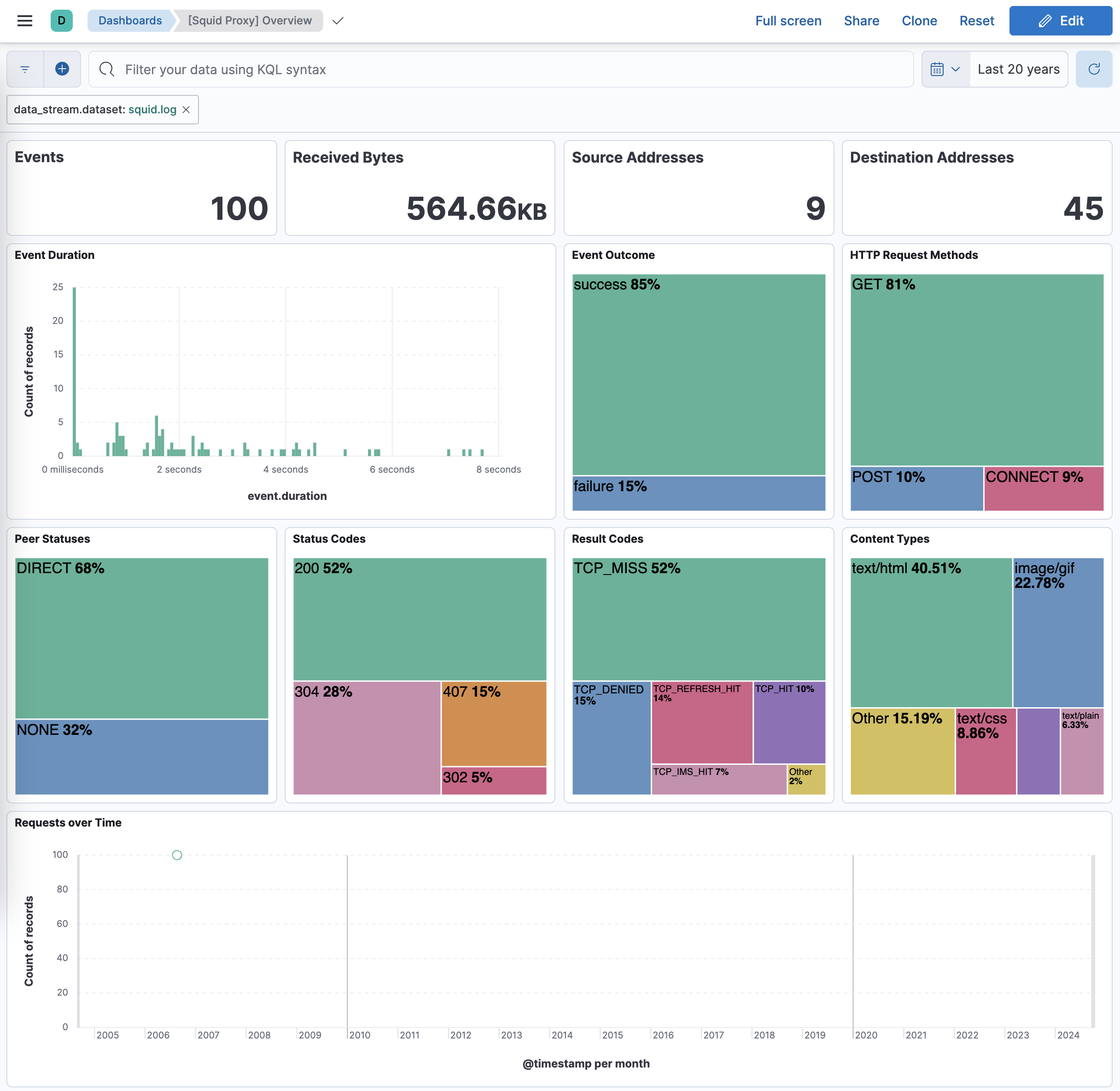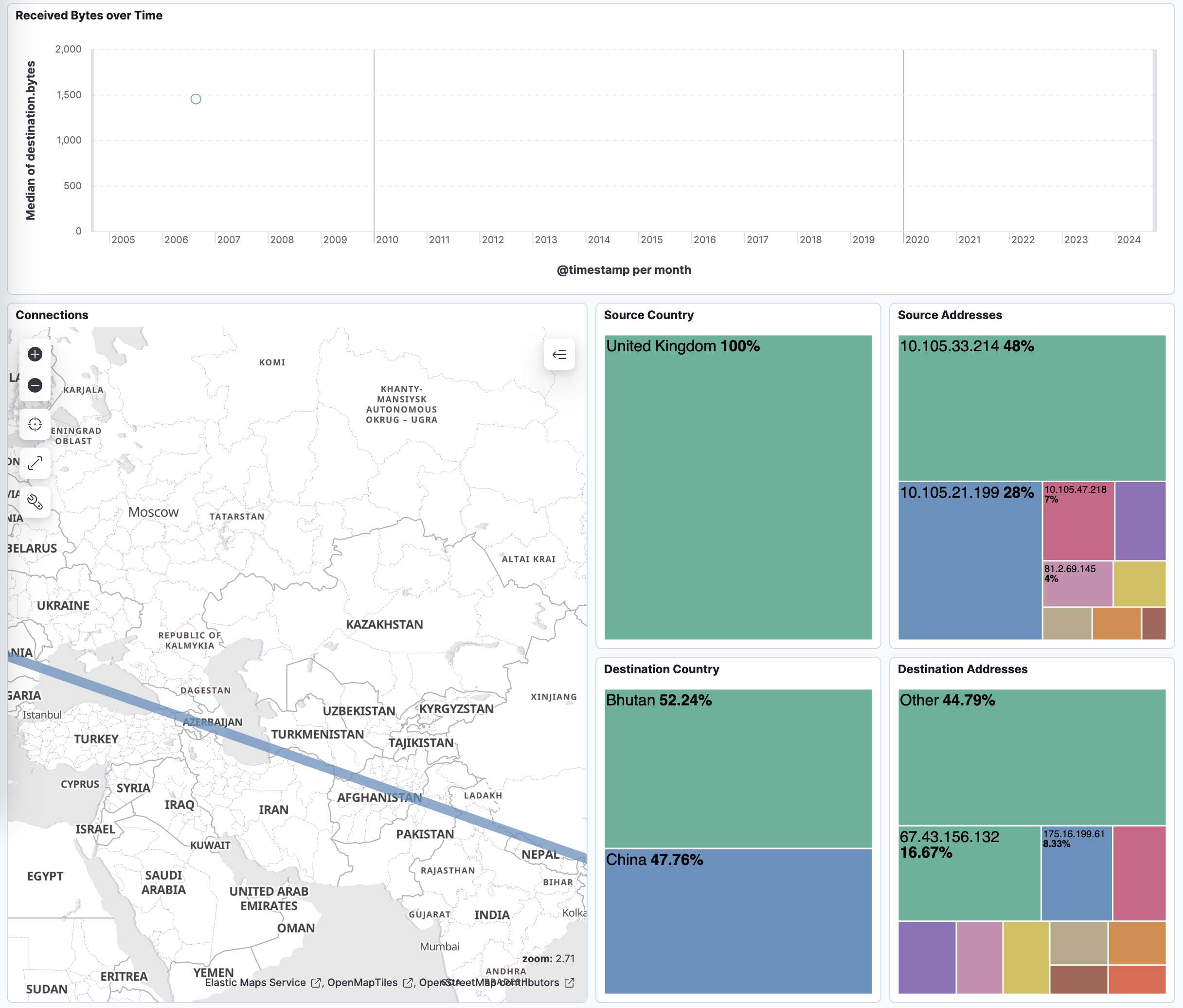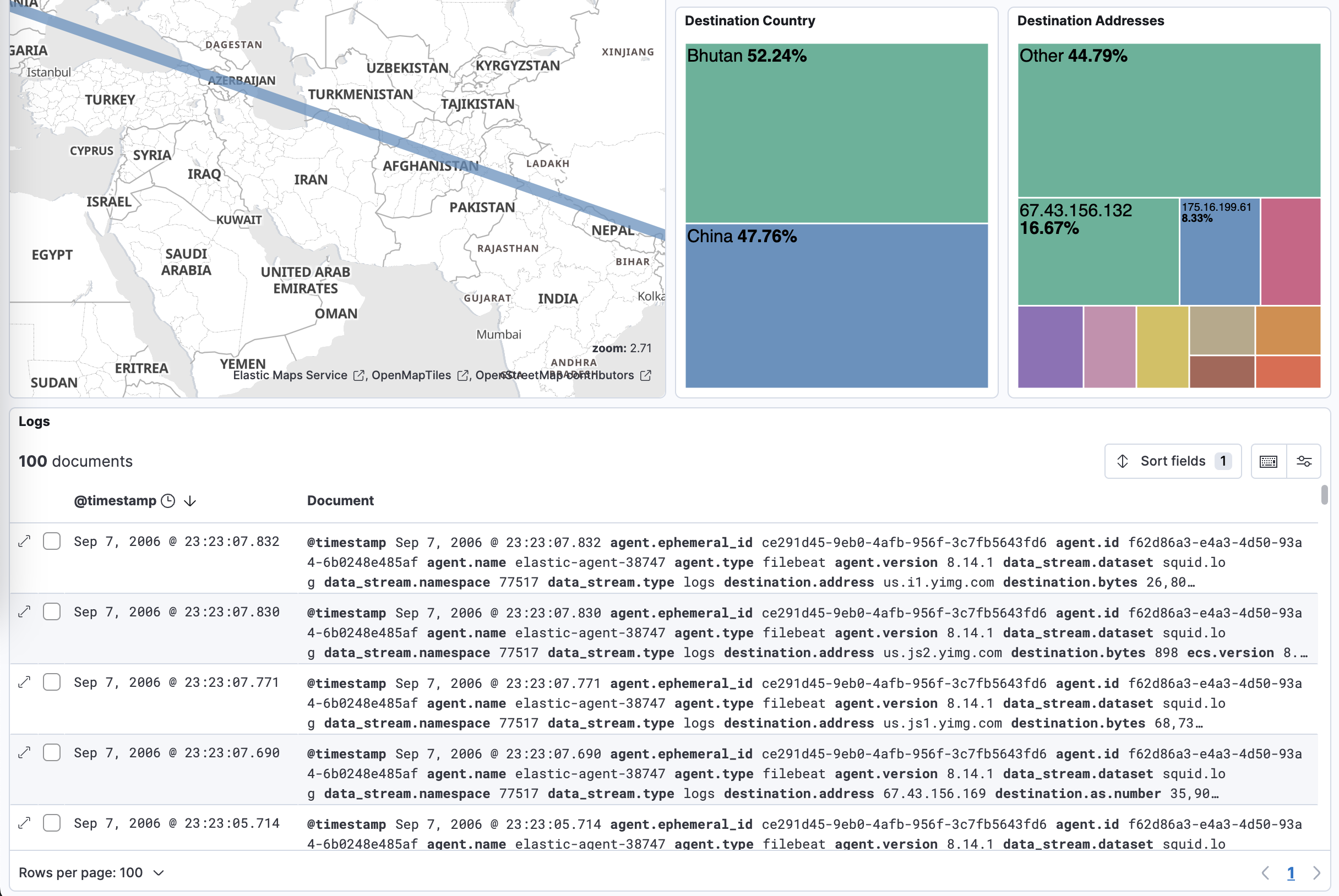Squid Proxy
| Version | 1.4.0 (View all) |
| Subscription level What's this? |
Basic |
| Developed by What's this? |
Elastic |
| Ingestion method(s) | File, Network Protocol |
| Minimum Kibana version(s) | 9.0.0 8.14.1 |
Squid is a caching and forwarding HTTP web proxy. Use the Squid Proxy integration to monitor Squid Proxy access logs.
This integration supports ingestion of logs from Squid Proxy, via the Filestream, TCP, and/or UDP inputs.
Log is used to retrieve access log messages generated by Squid Proxy. For more details, refer to access.log and Squid native access.log format in detail.
You need Elasticsearch for storing and searching your data and Kibana for visualizing and managing it. You can use our hosted Elasticsearch Service on Elastic Cloud, which is recommended, or self-manage the Elastic Stack on your own hardware.
Elastic Agent must be installed. For more details, check the Elastic Agent installation instructions.
The minimum Kibana version required is 8.14.1.
Configure Squid to export access logs using one of the supported methods (file (Module: Standard I/O), udp (Module: UDP Receiver), or tcp (Module: TCP Receiver)).
The integration supports the following format: Native log file.
- In Kibana go to Management > Integrations.
- In the Search for integrations bar, type
Squid Proxy. - Select the
Squid Proxyintegration from the search results. - Click Add Squid Proxy to add the integration.
- Add all the required integration configuration parameters according to the enabled input type.
- Save the integration.
The log dataset collects Squid logs.
Example
{
"@timestamp": "2006-09-08T04:21:52.049Z",
"agent": {
"ephemeral_id": "703e0801-aef8-4d26-aa48-12c7673f6df0",
"id": "29b8ade0-b4ef-4ce2-ab55-0acc99bbb914",
"name": "elastic-agent-52603",
"type": "filebeat",
"version": "8.15.0"
},
"data_stream": {
"dataset": "squid.log",
"namespace": "63238",
"type": "logs"
},
"destination": {
"address": "175.16.199.115",
"bytes": 19763,
"geo": {
"city_name": "Changchun",
"continent_name": "Asia",
"country_iso_code": "CN",
"country_name": "China",
"location": {
"lat": 43.88,
"lon": 125.3228
},
"region_iso_code": "CN-22",
"region_name": "Jilin Sheng"
},
"ip": "175.16.199.115"
},
"ecs": {
"version": "8.17.0"
},
"elastic_agent": {
"id": "29b8ade0-b4ef-4ce2-ab55-0acc99bbb914",
"snapshot": false,
"version": "8.15.0"
},
"event": {
"agent_id_status": "verified",
"category": [
"web"
],
"dataset": "squid.log",
"duration": 5006000000,
"ingested": "2024-09-03T18:27:38Z",
"kind": "event",
"original": "1157689312.049 5006 10.105.21.199 TCP_MISS/200 19763 CONNECT login.yahoo.com:443 badeyek DIRECT/175.16.199.115 -",
"outcome": "success",
"type": [
"access"
]
},
"http": {
"request": {
"method": "CONNECT"
}
},
"input": {
"type": "filestream"
},
"log": {
"file": {
"device_id": "35",
"inode": "442644",
"path": "/tmp/service_logs/squid-log-access.log"
},
"offset": 0
},
"observer": {
"product": "Squid",
"type": "proxy",
"vendor": "Squid"
},
"related": {
"ip": [
"10.105.21.199",
"175.16.199.115"
],
"user": [
"badeyek"
]
},
"source": {
"address": "10.105.21.199",
"ip": "10.105.21.199",
"user": {
"name": "badeyek"
}
},
"squid": {
"peer_status": "DIRECT",
"result_code": "TCP_MISS",
"status_code": 200
},
"tags": [
"preserve_original_event",
"squid-log",
"forwarded"
],
"url": {
"original": "login.yahoo.com:443"
}
}
Exported fields
| Field | Description | Type |
|---|---|---|
| @timestamp | Event timestamp. | date |
| container.id | Unique container id. | keyword |
| data_stream.dataset | Data stream dataset. | constant_keyword |
| data_stream.namespace | Data stream namespace. | constant_keyword |
| data_stream.type | Data stream type. | constant_keyword |
| event.dataset | Event dataset | constant_keyword |
| event.module | Event module | constant_keyword |
| input.type | Type of Filebeat input. | keyword |
| log.file.device_id | ID of the device containing the filesystem where the file resides. | keyword |
| log.file.fingerprint | The sha256 fingerprint identity of the file when fingerprinting is enabled. | keyword |
| log.file.idxhi | The high-order part of a unique identifier that is associated with a file. (Windows-only) | keyword |
| log.file.idxlo | The low-order part of a unique identifier that is associated with a file. (Windows-only) | keyword |
| log.file.inode | Inode number of the log file. | keyword |
| log.file.path | Full path to the log file this event came from. | keyword |
| log.file.vol | The serial number of the volume that contains a file. (Windows-only) | keyword |
| log.flags | Flags for the log file. | keyword |
| log.offset | Offset of the entry in the log file. | long |
| log.source.address | Source address from which the log event was read / sent from. | keyword |
| squid.content_type | The content type as seen in the HTTP reply header. | keyword |
| squid.peer_status | A code explaining how the request was handled, by forwarding it to a peer or going straight to the source. | keyword |
| squid.result_code | The outcome of the request. | keyword |
| squid.status_code | The status of the result. | long |
This integration includes one or more Kibana dashboards that visualizes the data collected by the integration. The screenshots below illustrate how the ingested data is displayed.
Changelog
| Version | Details | Minimum Kibana version |
|---|---|---|
| 1.4.0 | Enhancement (View pull request) Preserve event.original on pipeline error. |
9.0.0 8.14.1 |
| 1.3.2 | Enhancement (View pull request) Generate processor tags and normalize error handler. |
9.0.0 8.14.1 |
| 1.3.1 | Enhancement (View pull request) Changed owners. |
9.0.0 8.14.1 |
| 1.3.0 | Enhancement (View pull request) Remove duplicated installation instructions from the documentation. |
9.0.0 8.14.1 |
| 1.2.0 | Enhancement (View pull request) Support stack version 9.0. |
9.0.0 8.14.1 |
| 1.1.1 | Bug fix (View pull request) Updated SSL description to be uniform and to include links to documentation. |
8.14.1 |
| 1.1.0 | Enhancement (View pull request) ECS version updated to 8.17.0. |
8.14.1 |
| 1.0.3 | Bug fix (View pull request) Fix broken link and various formatting issues for the Squid Proxy integration. |
8.14.1 |
| 1.0.2 | Bug fix (View pull request) Tolerate errors with uri_parts, ensure _tmp fields are removed in case of errors. |
8.14.1 |
| 1.0.1 | Enhancement (View pull request) Add documentation on supported formats. |
8.14.1 |
| 1.0.0 | Enhancement (View pull request) Add dashboard and improve documentation. Release integration as GA. |
8.14.1 |
| 0.21.0 | Bug fix (View pull request) Enhance mappings and add geoip enrichments. |
8.14.1 |
| 0.20.0 | Enhancement (View pull request) Rewrite integration with standard ingest pipelines. |
8.14.1 |
| 0.19.3 | Bug fix (View pull request) Add http.request.body.bytes to ECS mappings. |
8.0.0 7.14.1 |
| 0.19.2 | Enhancement (View pull request) Changed owners |
8.0.0 7.14.1 |
| 0.19.1 | Bug fix (View pull request) Fix exclude_files pattern. |
8.0.0 7.14.1 |
| 0.19.0 | Enhancement (View pull request) ECS version updated to 8.11.0. |
8.0.0 7.14.1 |
| 0.18.0 | Enhancement (View pull request) ECS version updated to 8.10.0. |
8.0.0 7.14.1 |
| 0.17.0 | Enhancement (View pull request) Update package to ECS 8.9.0. |
8.0.0 7.14.1 |
| 0.16.0 | Enhancement (View pull request) Ensure event.kind is correctly set for pipeline errors. |
8.0.0 7.14.1 |
| 0.15.0 | Enhancement (View pull request) Update package to ECS 8.8.0. |
8.0.0 7.14.1 |
| 0.14.0 | Enhancement (View pull request) Update package-spec version to 2.7.0. |
8.0.0 7.14.1 |
| 0.13.0 | Enhancement (View pull request) Update package to ECS 8.7.0. |
— |
| 0.12.1 | Enhancement (View pull request) Added categories and/or subcategories. |
— |
| 0.12.0 | Enhancement (View pull request) Update package to ECS 8.6.0. |
— |
| 0.11.2 | Bug fix (View pull request) Update docs to match field definitions. |
— |
| 0.11.1 | Bug fix (View pull request) Remove duplicate fields. |
— |
| 0.11.0 | Enhancement (View pull request) Update package to ECS 8.5.0. |
— |
| 0.10.1 | Enhancement (View pull request) Use ECS geo.location definition. |
— |
| 0.10.0 | Enhancement (View pull request) Update package to ECS 8.4.0 |
— |
| 0.9.0 | Enhancement (View pull request) Update package to ECS 8.3.0. |
— |
| 0.8.0 | Enhancement (View pull request) Update to ECS 8.2.0 |
— |
| 0.7.0 | Enhancement (View pull request) Update to ECS 8.0.0 |
— |
| 0.6.1 | Bug fix (View pull request) Regenerate test files using the new GeoIP database |
— |
| 0.6.0 | Enhancement (View pull request) Add 8.0.0 version constraint |
— |
| 0.5.4 | Enhancement (View pull request) Uniform with guidelines |
— |
| 0.5.3 | Enhancement (View pull request) Update Title and Description. |
— |
| 0.5.2 | Bug fix (View pull request) Fixed a bug that prevents the package from working in 7.16. |
— |
| 0.5.1 | Bug fix (View pull request) Fix logic that checks for the 'forwarded' tag |
— |
| 0.5.0 | Enhancement (View pull request) Update to ECS 1.12.0 |
— |
| 0.4.3 | Bug fix (View pull request) Requires version 7.14.1 of the stack |
— |
| 0.4.2 | Enhancement (View pull request) Convert to generated ECS fields |
— |
| 0.4.1 | Enhancement (View pull request) update to ECS 1.11.0 |
— |
| 0.4.0 | Enhancement (View pull request) Update integration description |
— |
| 0.3.0 | Enhancement (View pull request) Set "event.module" and "event.dataset" |
— |
| 0.2.0 | Enhancement (View pull request) update to ECS 1.10.0 and adding event.original options |
— |
| 0.1.4 | Enhancement (View pull request) update to ECS 1.9.0 |
— |
| 0.1.0 | Enhancement (View pull request) initial release |
— |


